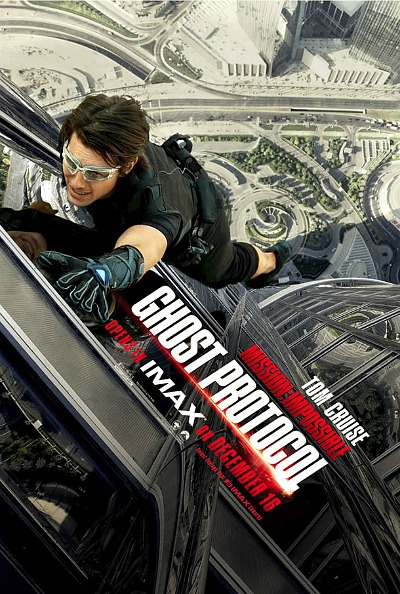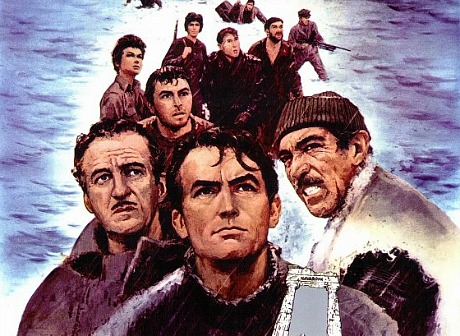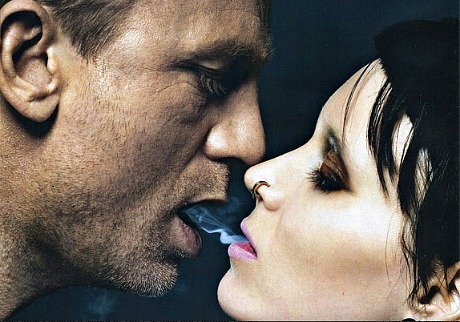You’re dead if you fall from a height of…what, 50 feet? 75 feet? Something like that. But theoretically falling from the 124th floor of Dubai’s Burj Khalifa Tower, which is 2717 feet high, is, like, an abstraction, man.

You’re dead if you fall from a height of…what, 50 feet? 75 feet? Something like that. But theoretically falling from the 124th floor of Dubai’s Burj Khalifa Tower, which is 2717 feet high, is, like, an abstraction, man.

Gerardo Naranjo‘s Miss Bala will now open on January 12, 2012 rather than the previously announced date of 10.14.11. This date isn’t posted on Coming Soon, the iMDB or even on the film’s own website. But Bala‘s marketing consultant David Dinerstein has just informed me of this.
“January 12th is a great date because it’ll give us more time for long-lead press and the ability to focus on a better awards campaign for the film,” Dinerstein said. “The Oscar nominations will be announced a few days later, and it’s already opened in Mexico, making it eligible for a Best Foreign Language Oscar.”
Pop quiz: what classic 1930s film used the word “bala” in a line of dialogue? Answer: King Kong. When Robert Armstrong‘s Carl Denham is trying to communicate with the hostile natives on Skull Island, he asks Captain Englehorn what the word for “friend” is, and Englehorn says “bala.” Denham opens his arms and takes a step forward, saying “Bala! Bala!” to the village chief. It doesn’t work.
To my knowledge Miss Bala is the first feature film has uses the Spanish term “bala” (which means bullet) in its title. Some English-speakers have had a confused reaction because Stephanie Sigman‘s character competes in a Miss Baja beauty contest.
Sony Home Video’s The Guns of Navarone Bluray streets on 10.18. It’ll look more robust and detailed than the various DVD versions, I’m sure, but according to a 9.29 Home Theatre Forum riff by restoration guru Robert Harris, this 1961 war film can only look as good as its appalling preservation history allows.

“To the best of my knowledge, The Guns of Navarone was photographed on the new Eastman 5250 stock, the first to have high level anti-dye fade characteristics,” Harris writes. “My comments are personal opinion, and some may disagree, but here goes.
“The film was a UK production, with some photography in Greece and L.A. Had a decision been made to have the original negative processed by Technicolor London, Technicolor Hollywood or any other high-end lab, Columbia wouldn’t be facing many of the problems they do today. Since dye transfer prints were produced, as well as at least a small number of 70mm blow-ups, why not allow the lab doing the printing to handle the production all the way through?
“Presumably based upon a studio contract, the processing work was given to Movielab, which is a couple of steps above forcing the professional photographer shooting your wedding photos to drop his exposed film through a slot at the local Uncle Joe’s Ribs, Photo Lab & Storm Door Company.
“I’m unaware of the production of separation masters to protect the show.
“In 1989, Columbia went to UCLA for aid to save the film, and archivist Robert Gitt performed the necessary tasks to the best of analogue abilities. The final result at least stabilized the image problems, while protecting the original mag tracks.
“Two decades later, a return to the original surviving elements in 4k was in order.
“But such a return doesn’t guarantee the superb image that this film could have had, had everything been done correctly back in 1961.
“As I recall, the final reel of original negative may also be missing. Dupes are built in throughout, and color, for the most part is, well… acceptable.
“I’m taking the long way around to make the point that there is nothing further that can be done to make the film look any better. And everything goes back to those early decisions.
“What does TGoN look like?
“Pretty much as the knowledgeable eye would think. Grainy in parts, occasional contrast problems along with optical anomalies, plus what some here will refer to as ‘force fields’ around certain objects, normally in high to low contrast situations. Flesh tones range from decent to awkward brownish green with red highlights.
“And there is very little that can be done about it.
“The technical folks at Sony/Columbia have used all the tools at their disposal, but one cannot make a proverbial silk purse from old Eastman stock processed by Movielab.
“And there you have it.
“This is a terrific and important film, that happens to be beautifully acted and is extremely entertaining.
“But the point needs to be made that not only does this Blu-ray not look like a new film, it isn’t going to look like what many will perceive a high quality, important 1961 production should look like. Know that going in, and enjoy the show, and you won’t be disappointed.
“They don’t make them like this anymore.”
Wells comment: I won’t be seeing the Navarone Bluray until I return to Los Angeles this weekend, but this sounds like a situation that requires a little tasteful DNRing. When you buy a Bluray you want that extra quality, and if the film itself doesn’t have this, you need to digitally crank it up.
This New York Observer-captured clip of an Occupy Wall Street protestor making mince meat of a Fox News stooge never aired. The guy is easily as sharp and well-spoken and spot-on with his arguments as Cenk Uygur, if not more so. He should be on Young Turks or MSNBC or Current TV. And that Civil War-era Union army cap is a nice touch.
You’ll recall that 20th Century Fox had its first press screenings of Rise of the Planet of the Apes very late in the game, only days before it opened on 8.5. When some suggested that the film might have built up more opening-weekend steam if early positive reactions had circulated earlier, Fox reps said that a demanding post-production schedule kept them from showing it any sooner.
“I know for a fact it was about effects delivery,” a rep told me. “It was down to the wire as this was originally going to be a Thanksgiving release.”
Now it turns out the real reason for Rise of the Planet of the Apes not being ready to show until early August was because of a re-shoot of the film’s finale that happened over the July 4th weekend.
Badass Digest‘s Devin Faraci, drawing from a Hollywood Reporter story, has written that “the original ending had James Franco’s character dying. At the hands of humans, no less. Shot to death by armed humans who have chased the apes into the forest. [And then] the ape horde descends on the people and tears them to pieces, a reversal of the opening scene where Bright Eyes is captured in the jungle.
“This isn’t the only change from an early version of the script,” he writes. “Originally Rocket and Caesar had a big brawl at the end as well. In fact lots of things changed lots of times over the course of the script’s development.
In any event, “Everybody hurried back to set this summer, just a month before release, to reshoot the ending.”
During last weekend’s Visual Effects Society Production Summit in Beverly Hills, Fox’s president of postproduction Ted Gagliano said Franco was brought in for the re-shoot over the July 4th holiday weekend. “We shot for three hours and (Franco) was back on the plane,” Gagliano recalled. He added that this change led to a challenging final weeks of what was originally a 41-week post schedule that involved extensive visual effects work.”
The original discarded ending will apparently be included on the Bluray.
Lars Von Trier‘s Melancholia plays tonight at the New York Film Festival. (I couldn’t get there in time but I’ll attend the after-event.) I’m fairly certain that 90% of the questioners speaking with Kirsten Dunst on the red carpet asked her about Von Trier’s Nazi comment that he made in Cannes. That has always been an oppressively lame thing to dwell on. It’s a shame that it won’t go away.
Less than an hour after Von Trier blurted out those idiotic remarks, I urged readers to forget it. Von Trier “has turned into a very dry and clumsy kidder,” I wrote. “Nothing is even half-sincere — absurdist put-on all the way.”
“Please, please don’t take this guy seriously,” I wrote later on. “Okay, go ahead…what do I care? But he lives to say stuff like this. He’s an artist, a madman…unbalanced. And he loves getting this kind of attention.
“Lars von Trier has, press conference-wise, often played the role of a provocateur, a kidder — he loves to poke and agitate and whip the press into a lather,” I wrote toward the end of the festival. “Nazi-winking, even in jest, in a huge no-no, of course, but we all know that Von Trier is a serious artist and a humanitarian who, despite his impishness, has time and again made films that see through to the sad soul of things.”
I’m glad that John Cameron Mitchell and Melanie Laurent got nice paychecks for doing this newish Hypnotic Poison commercial, but cinematically it’s nothing, nothing, nothing, nothing. Aren’t all perfumes about trying to “put a spell” on someone? Isn’t it redundant to hear Nina Simone sing these actual words? Isn’t it a bit redundant to use the word “hypnotic” in the first place?
This Star Wars family portrait painting has been commented upon elsewhere, but I wanted to show it to those who haven’t bought the Star Wars Bluray set (which I still haven’t seen, being without a Bluray player or large high-def monitor during my New York visit) and just say for the record that this is the most concise visual expression of the 21st Century mind of George Lucas that I’ve ever seen.
The ruthless, power-mad dark side vs. the serene and illuminated spirituality of the Jedi delivers the key dramatic tension of the Star Wars films. By any common standard these two poles are most memorably represented by Darth Vader and Alec Guinness‘s Obi-Wan Kenobi, or Mark Hamill‘s Luke Skywalker.
But who is the biggest front-and-center presence in this collage? The giver of one of the most agony-inducing high-profile performances in the history of big-budget epic movies — Hayden Christensen.
And where are the truly legendary characters who toplined the original Star Wars and especially The Empire Strikes Back, by far the finest film in the series? Let’s see…oh, there they are, all tucked away in the top right-hand corner, like vaguely unwanted guests at a wedding who’ve been seated at a table next to the kitchen with the waiters running in and out and the door swinging open and closing, over and over and over.
The collage basically says that the prequel guys, including Jake Lloyd and Jar-Jar Binks, are the core of the legend and the franchise, and that everything of lasting or profound value in the series stems from those three movies and their stories. Good Heavenly God!
Why are there two Chewbaccas? I realize that “Chewy” is part of a wookie race but still.
Here’s Press Play’s final chapter of the Roman Polanski series, which began last week. Cut and commented upon by Matt Zoller Seitz along with Kim Morgan.
Seitz update: “Mr. Peel is correct. This video essay is a collaboration between me and Kim, but the text is a slightly rewritten version of a column Kim originally wrote for her blog Sunset Gun. If you watch to the end you will see that the first credit after the final shot is ‘written and narrated by Kim Morgan,’ followed by my editing credit.”
Awards Daily‘s Sasha Stone, Boxoffice.com’s Phil Contrino and I recorded Oscar Poker 50 yesterday morning. I have to say that it’s essential for good chatter to talk about films that have moved us, period, and not to always reduce the equation to “is it Oscar-worthy or not?” Let the chuckleheads come to us, and not vice versa. Here’s a non-iTunes, stand-alone link.

“It’s a drag how late-summer, early-fall festivals like Telluride and especially Toronto are now too often seen as warm-ups for the Oscars. Both events solicited that attention, and grew more influential as a result. Yet is that what we want from film festivals? This isn’t as true of Cannes…because it takes place in May and remains a showcase for world cinema and French cultural patrimony. It’s where Brad Pitt can work the red carpet, but also where filmmakers as dissimilar as Terrence Malick and Apichatpong Weerasethakul can be talked about without that chucklehead, Oscar, sucking up all the air in the room.” — N.Y. Times critic Manohla Dargis in a 10.2 chat piece with A.O. Scott about the fall festivals.
Rooney Mara‘s eyebrows are too dark, but I can let that slide.
